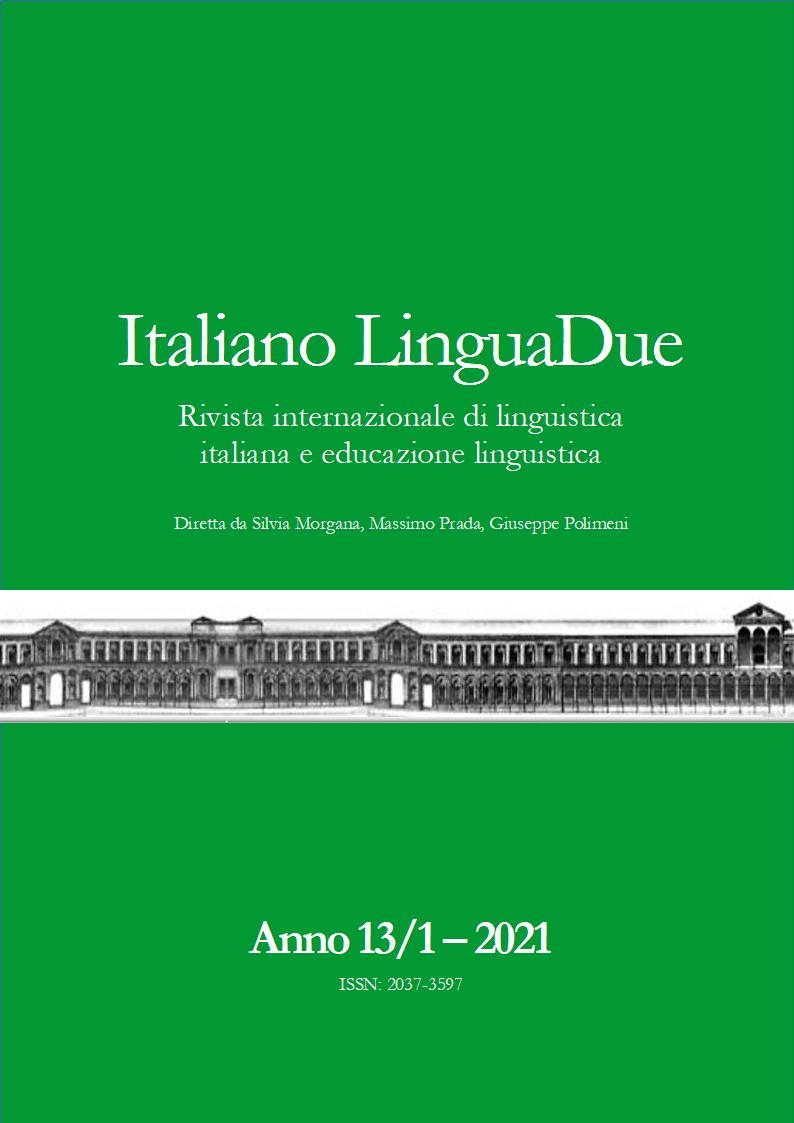LADDER: UN CORPUS DI SCRITTURE DIGITALI PER L’INSEGNAMENTO DELLA PRAGMATICA IN L2. UN ESEMPIO DI ANALISI DI DISDETTE IN WHATSAPP
DOI:
https://doi.org/10.13130/2037-3597/15867Abstract
Molte recenti ricerche hanno sottolineato come sia utile la creazione ed analisi di corpora per la didattica della pragmatica che, a differenza di altri livelli linguistici, come ad esempio la sintassi, non possono essere spiegate con regole ma con il riferimento a valori tendenziali o scelte più o meno adeguate in un certo contesto. Questo vale a maggior ragione per le interazioni attraverso media digitali, come e-mail e servizi di messaggistica, per il cui apprendimento i parlanti non nativi hanno pochi modelli di riferimento in quanto scritture private che trovano scarso spazio in manuali o corsi di L2. Dal febbraio 2020 nell’Istituto di Didattica disciplinare dell’Università di Innsbruck viene condotto per tre semestri un seminario in cui gli studenti contribuiscono alla raccolta e analisi del corpus LADDER (LeArners’ Digital communication: a DatabasE for pRagmatical competences). Nella prima fase del corso gli studenti sono impegnati nella raccolta di un corpus di scritture digitali attraverso questionari online rivolti a apprendenti di italiano tedescofoni dei livelli A2-C1 e a parlanti nativi. I questionari vertono a elicitare, attraverso Discourse Completion Task, atti linguistici della richiesta e della disdetta in livelli crescenti di distanza sociale e diversi media. Nella seconda fase il corpus viene analizzato dagli studenti secondo un’ottica pragmatica, annotato e i dati raccolti vengono elaborati secondo modelli statistici. Il corpus taggato sarà reso disponibile in formato Excel e XML open access. Questo contributo mostra alcuni risultati delle analisi condotte con il corpus LADDER in ottica contrastiva L1/L2 durante i seminari di didattica. Oltre ad illustrare un modo di produzione di strumenti per la conoscenza dell’italiano L1 e L2 attraverso tecnologie digitali il contributo si profila come modello di didattica basata sui corpora.
LADDER: a corpus of digital writings for teaching pragmatics in L2. An example of analysis of cancellations in WhatsApp
Many recent studies have underlined how useful the creation and analysis of corpora for the teaching of pragmatics is. Unlike other linguistic levels, such as syntax, pragmatics cannot be explained by rules but by reference to tendential values or choices that are more or less appropriate in a certain context. This is all even truer for interactions through digital media, such as email and messaging services, where non-native speakers have few models of reference since personal writing finds little space in manuals or L2 courses. Since February 2020, a seminar where students contribute to the collection and analysis of the corpus LADDER (LeArners' Digital communication: a DatabasE for pRagmatical competences) has been conducted for three semesters at the Institute for Discipline Teaching at the University of Innsbruck. In the first phase of the course, students are engaged in the collection of a corpus of digital writings through online questionnaires addressed to A2-C1 German-speaking Italian learners and native speakers. The questionnaires aim at eliciting, through Discourse Completion Tasks, linguistic acts of requesting and cancellation in increasing levels of social distance and different media. In the second phase, the corpus is analyzed by the students from a pragmatic perspective, annotated and the collected data are processed according to statistical models. The tagged corpus will be made available in Excel and XML open access formats. This contribution shows some results of the analyses conducted with the LADDER corpus in an L1/L2 contrastive perspective during the teaching workshops. In addition to illustrating a way of producing tools for the knowledge of Italian L1 and L2 through digital technologies, the paper presents a model of corpora-based teaching.




